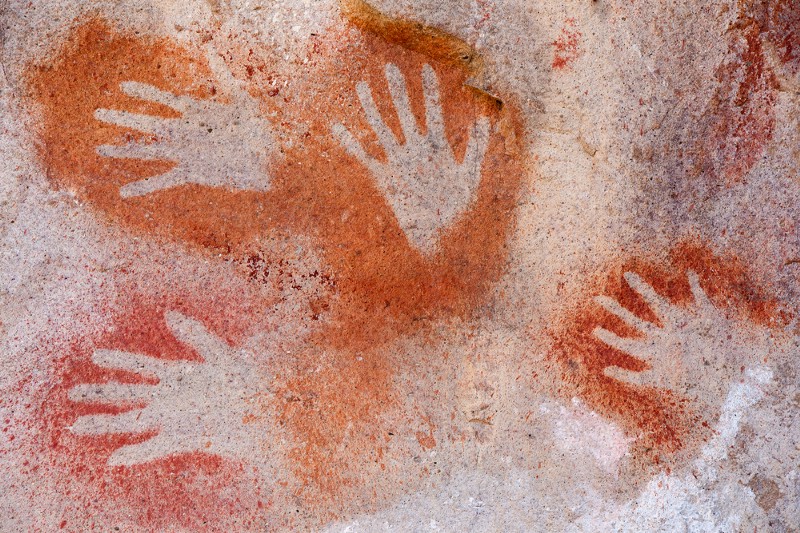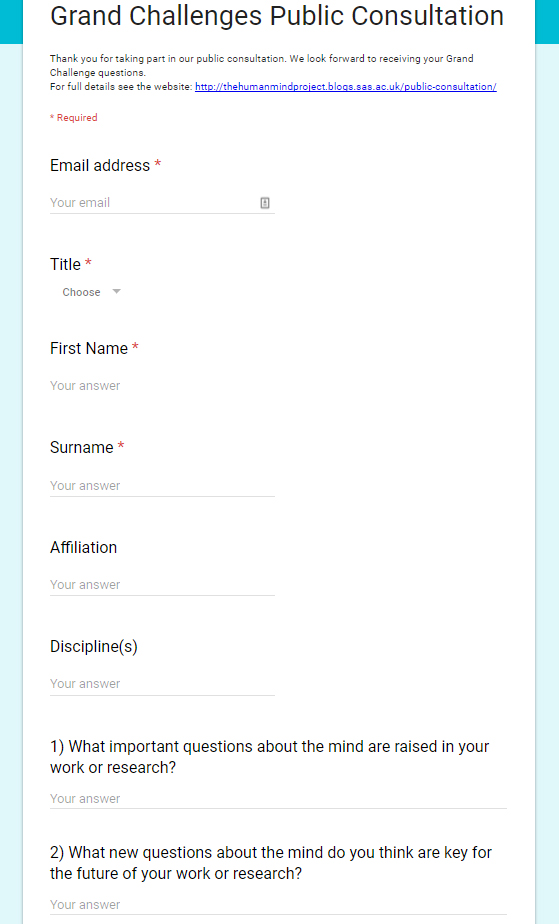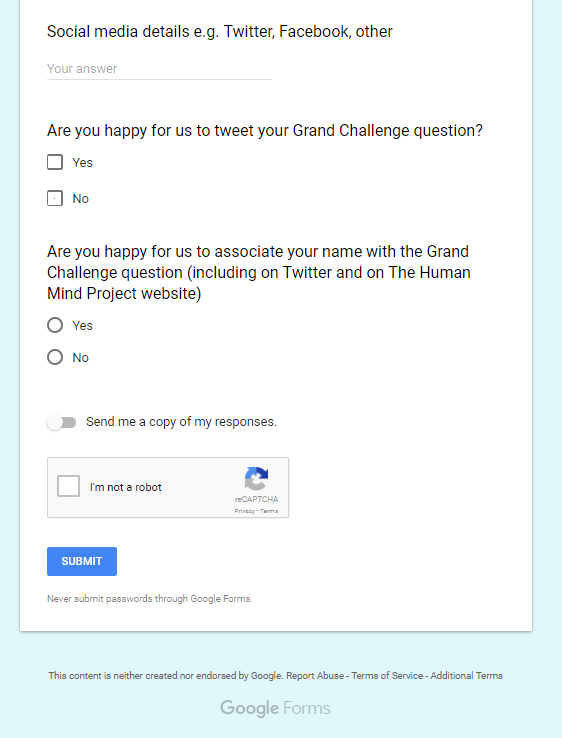The Public Consultation
The public consultation invited academics, students, and practitioners from across the higher education sector, and beyond, to contribute to the life and activity of The Human Mind Project.
Held between 22 May and 22 June 2017, the consultation gathered Grand Challenge questions online. We took these questions to The Human Mind Conference at Cambridge University in July 2017, where they formed the basis of an innovative group conferencing exercise. In two Grand Challenge Sessions an international, cross-disciplinary group of over 130 experts and participants worked on the results of the public consultation to evaluate and clarify the questions, and develop new criteria for assessing interdisciplinary research projects.
The Process
We asked participants to fill in an online questionnaire in which they responded to two questions:
- What important questions about the mind are raised in your work or research?
- What new questions about the mind do you think are key for the future of your work or research?
Participants were also asked to supply personal details, which remained confidential, and for permission to associate their name with their responses for the purposes of promoting the public consultation online
We reached out to people working with the mind through our events and online in blog posts, videos, on Twitter, and in newsletters. Below, a short video of the Project’s leader, Professor Colin Blakemore explains the Grand Challenges. These documents were designed to explain the purpose of the Grand Challenges and, specifically, the role of the public consultation.
Instructions and contextual information were supplied to participants on the website and as a PDF document.
In addition, a blog post was published on Medium and another on Talking Humanities and a short video recorded featuring the project director, Professor Colin Blakemore. These documents were designed to explain the purpose of the Grand Challenges and, specifically, the role of the public consultation.
30 May 2017 | The Grand Challenges Public Consultation: Where will the future of research on the mind take us?
 The Human Mind Project’s Grand Challenges Public consultation is the first exercise of its kind to be conducted across the mind and brain sciences. Help us define future research agendas and new interdisciplinary funding styles.
The Human Mind Project’s Grand Challenges Public consultation is the first exercise of its kind to be conducted across the mind and brain sciences. Help us define future research agendas and new interdisciplinary funding styles.
1 June 2017 | SAS programme hopes for head start with ‘mind sourcing’
Mattia Gallotti, manager of ‘The Human Mind Project’ at the School of Advanced Study, discusses the launch of the first Grand Challenges Public Consultation on the key questions in the study of the mind.


The Result
Responses to the public consultation were received through an online form, on Twitter and by email and video interview. This generated over 130 questions that could be used for the Grand Challenges exercise.
How can humanities & sciences work together to understand the operation of emotion in politics? @ProfThomasDixon couldn’t resist a 2nd #GC17 pic.twitter.com/HZSfcC7iEI
— The Human Mind Proj (@HumanMindDebate) May 31, 2017
Another taster of a #GrandChallenges17 question submitted online this week! Thanks @distributedcog ^A pic.twitter.com/GpjnE4tsyq
— The Human Mind Proj (@HumanMindDebate) June 6, 2017
How does the #mind knit together, or form a narrative of, its past, present & future? Another brilliant contribution from @cfernyhough #GC17 pic.twitter.com/7ZXX8n3Cbf
— The Human Mind Proj (@HumanMindDebate) June 1, 2017
How does the embodied & embedded brain give rise to conscious experiences of world & self? 1st #GrandChallenges17 question from @anilkseth! pic.twitter.com/vl21oobOxi
— The Human Mind Proj (@HumanMindDebate) May 22, 2017
How should we consider the agency of the self, others & the non-human in relation to the mind? #GC17 from Veronica Strang @DurhamIAS pic.twitter.com/TF46qfnq6F
— The Human Mind Proj (@HumanMindDebate) May 25, 2017
How are mental traits that are considered distinctively human built from evolutionary precursors found in other species? @howbrainsevolve pic.twitter.com/5FWfu3KJnD
— The Human Mind Proj (@HumanMindDebate) May 24, 2017
| How does the embodied and embedded brain give rise to conscious experiences of the world and of the self? | How does physical matter create consciousness? | Why does it feel like we have free-will when we live in a Universe governed by deterministic Laws of Nature? | Should the West abandon the term ‘consciousness’ to mean everything that the mind does? Is it too inadequate a term? | Where is the mind? How should we consider the agency of the self, others and the non-human in relation to the mind? |
| Does an understanding of time depth and context in which the human ‘connectome’ developed, assist us with questions related to the similarities and differences between humans and other animals? | To what extent is it reasonable to consider the symptoms of mental illness in terms of aberrant brain processes and how can we pose and answer such a question while avoiding a harmfully reductionist approach? | How does the brain deal with time and collate sensations into a memory? Does memory have a timestamp? | Why does Consciousness exist? | How can the humanities and sciences work together to understand the operation of emotion in the world of politics? |
| What exactly is empathy and what is its relevance to prosocial behaviour? | How do we bring interpretive social scientific data on subjective experience more fully into cognitive neuroscientific paradigms? | How (or why) does reading work? How do words on the page become ideas in our heads? | What do shifts between more embodied and more abstract language invite readers minds to do? | Would a more liberal and interdisciplinary programme in UK Higher Education improve research on the mind? |
| Should we hold that non-human primates such as chimpanzees have mind-reading abilities? If so, then what are the ethical or practical implications of discovering that non-human animals have sophisticated cognitive abilities? | Can we gain a deeper understanding of the mind from the perspective of human behaviour in a changing world? | What developed structures within the mind reflect the distinctive approaches to doing science represented by the physical and life sciences? | Can we start to use cognitive neuroscientific model-building for particular aspects of lived human experience, attending to phenomenological variation? | What is the role of the product ‘world’ in constituting the ‘human self’? |
| What is the interconnection between the body and the mind? | What can the phenomenon of motor resonance tell us about reading literature? | What is the structure and epistemology of intentionality when using symbolic presentations? | Are we more body or mind? | How can we apply empirical data to theoretical (conceptual) work in the philosophy of the mind? |
| Do we misunderstand how our own senses work? | What is the role of comparative creativity in the arts and sciences? How strong are the similarities between the typical narrative experiences of creating new ideas? | How might an ideal rational mind perform probabilistic reasoning and make decisions under conditions of uncertainty? | The brain mechanisms of memory are constructive and inventive, so how do we incorporate resources from our environments to remember the past well enough?
|
What is the nature of free will? |
| How have daydreams and mind wanderings shaped Western concepts of the self? | How do minds interact? How does the brain enable us to do this? | Instead of altering the ethics code, is what is needed a strict adherence to the inception stage? | What are the neural computations underlying social interactions? | Psychedelic induced ego-dissolution: what is it? |
| What makes human co-operation fundamentally different from how other animals co-operate? | If Gravitational attraction is real for science, why not the emotional attraction? | How are emotions socially constituted and how do they shape social and political affairs? | How does language augment and co-operate with other mental functions? | How does the mind relate to the environment and external agencies? |
| Does education change minds when it answers questions like: is an interdisiplinarian just as vital as an expert? Can a humanist contribute to science? | How do we distinguish between those creatures that possesses consciousness and those that don’t? | Can we situate cognitive-neuroscientific model-building within relevant and essential levels of understanding, including the personal, social, historical and cultural? | Psychedelic induced feelings of profound ‘oneness’: what underlies this? | How does the perception of time vary with the physical size of the observer? |
| How can historians contribute meaningfully to the scientific study of emotions, through new collaborative research projects? | How are previous paradigms, models, and concepts useful in answering today’s questions about the mind and brain? | How does language impairment affect everyday communication? How can we improve everyday communication for people with aphasia? | What is the connection between the body, the mind, and the world? | Should we resist the drive towards consilience and embrace the possibility that different levels of understanding the mind and brain might not link neatly into each other? |
| Is the self just a sensation that represents computation that distinguishes ‘of body’ and ‘not of body’ to pfcortex? | Can the mind be reduced to the brain? | How are mental traits that are considered distinctively human (such as those associated with language) built from evolutionary precursors found in other species? | Does history (historical/cultural specificity) play a role in shifts between embodied and abstract language? | When we read fiction or poetry what are the relationships between our pre-conscious responses and our conscious ones? |
| How is human thought socially patterned and developed? | Are other people sources of misinformation for human memory or/and do they offer essential scaffolding for memory? | Can we explain the mind as much more than its present narrow depiction as ‘consciousness’, linking ‘mind’ and its routine functions meaningfully with the concept of SELF, linking the stuff of human self with the goals of Nature or Existence? | If the brain is a noun and the mind is a verb, then can we say anything that is true, useful and applies meaningfully to both? | What is the transcendence of finite causality implied in our capacity to make judgements of fact and to consent to those desires we judge to be of true value, in the context of the natural and social sciences?
|
| How might disruptions of memory effect not only our past, but also our present and future selves? | What are the physico-informational limits of the brain, and how are neural circuits implemented to carry out intelligence? | What are the cultural implications of the emerging view that the human mind is largely unconscious? | How can I know when I am supporting a person with profound and multiple disabilities that they are ‘in the room with me?’ How long is that ‘window of opportunity?’ Is it fixed? | Do we experience the same beauty from viewing a sunset or an artwork?
|
| When we are thinking why does it feel as if this is coming from the skull? Is it because we are informed that the mind is inside the brain or are we affected by the energy production in the brain while thinking? | How does the mind knit together, or form a narrative of, its past, present, and future? | What could be the lessons from the Human Brian Project for AI? | How do minds evolve? | Should the results of Pearlab and the double slit quantum erasure need to be explained by our future theories? |
| How are we to get at the details of the conscious mind? | How is information stored by the brain, and how is it made useable for person-level metacognition and interpersonal transactions? | How does the brain represent our bodily experience to give rise to a mental sense of our self? | Are psychedelics therapeutically useful and how? | How are social norms shaped by the self-control of the mind? |
| How is the mind creative? | How do our brains support real-world dynamic social interactions? | Can we bring neuroscience research out of the laboratory, and into the real world? | How can we account for the disparities between what we ‘think’ we do and what we ‘actually’ do? | There is a fashion for denying that any inner unit receives signals in the form of experiences. Is this right and what type of unit are we talking about and what are its functional boundaries? |
| What drives our actions? Is it desire, morality, self-image, pleasure, self-knowledge or self-deception and how do these interact? | Does the mind have, yet unknown, inherent tools that helps it create new knowledge? | How do minds create and stabilise culture and what is culture, materially? | To what extent are our moral concepts and judgements affected by or independent from our evolutionary history? | How should we understand agency and responsibility if the brain is a complex but entirely physical device? |
| How and why does consciousness create the illusion of physical matter?
|
How does human cognitive capacities make complex social co-operation and co-ordination possible? For example, how do we create institutions on a grand scale, and of which can only be found in human societies? | Does Nature dictate the brain/wetware and the senses/hardware, while nurture creates the infinitely variable philosophical algorithmic software? | If the brain predicts the most likely explanation for existing (sensory) information based on priors and the conscious experience is our attempt to minimise the prediction error, then how does this minimisation transmute from ‘brain activity’ to an experience? | How can the concept of the mind contribute to producing theories that are capable of encouraging practitioners as well as theorists to become self-reflexive to understand their familiar assumptions and theories better? |
| Is the psychedelic state ‘regressive’ in the ontogenetic and phylogenetic sense? | What is the relationship between perceptual experience and ‘reality’? | Can minds be extended to artefacts? Can minds be distributed between group members? Is Artificial General Intelligence possible? | What is creativity? Is it a skill, a virtue, or some other kind of disposition? | How are consciousness and mental representation related? Can consciousness be understood as a form of mental representation or intentionality? |
| Where is the mind? How should we consider the agency of the self, others and the non-human in relation to the mind? | How do collective behaviours emerge from social interactions and individual tendencies? | Is it possible to say useful things about mental processes without a comprehensive understanding of how body and mind processes interact? | What does it mean in 2017 to try to use date from so-called ‘introspective methods’ in cognitive neuroscientific paradigms? | Could neuroimaging or other scientific experiments trace what happens when writers shift from more embodied to more abstract language? |
| What makes a social connection between two people? How can we create a science of social interaction? | How does our commonsense conception of the mind (‘folk psychology’) relate to what psychology and neuroscience discover? | How can we, at organisations, foster Collaboration behaviour and intention through organisational design?
|
Do you think a healthy immune system is a key factor for a healthy and happy mind? | What is the future of man-machine hybrid intelligence? |
| To what extent is it possible to ‘know what it was like’ to be a thinker in a previous century? | How should comparative psychologists evaluate hypotheses with great ethical or practical import? | Do real people have a comparative preference for actions for which they have more guidance by the evidence, all else being equal? | Who speaks when we speak to ourselves, or when hallucinated voices speak to us? | What role does ‘self awareness’ play in shaping the self? |
| What are the relationships between minds and brains? | What are some reasons why literary characters engage in ‘mindreading’ more or differently from others? | How and why did consciousness evolve? | Is the psychedelic state a richer, more entropic state of consciousness? | Through methodological innovation can we seek to effect closer linkages between the ‘subjective’ qualities of human experience and the ‘objective’ data of the neurosciences? |
| Do culture and technology influence changes in the brain by focussing or stretching the mind? | What is the relationship between sensory-motor control and cognition? | How can we accelerate empathy and connection to other diverse humans, and how can we lower barriers to the different others? | Is creative activity a purely mental process, or does it also essentially involve environmental factors? | How were the universal physical constants fine-tuned to the Big Bang to enable living conscious beings to exist? |
| What is the relationship between language and cognition? How is this relationship impacted by language impairment? | What is the nature and importance of freedom and agency in psychology, social sciences and the sciences in general?
|
Is Science right to stick with the narrow idea of ‘consciousness’ in its notion of reality? Is there the involvement of an yet ‘unknown’ sense organ behind the entire process?
|
How can the social sciences, in particular psychoanalysis benefit from the framework given in a critical philosophical anthropology? | What are the fundamental relationships between information and intelligence, as manifest in the brain? |
| As mind wandering is a state of mind, primarily accessed by introspective measures, under what conditions should experiment participants be trained to access, observe, and record these inner mental states? | Is our thinking determined by factors outside of ourselves? | How do we incorporate resources from our environments to remember the past well enough? | Are there similarities in psychology and neurobiology of the psychedelic state and dreaming, and if so what are these? | How do questions about the structure of the mind relate to moral psychology and hence to ethics? |
| How does neuroscientific knowledge reshape conceptions of agency, authenticity and responsibility? | How can I easily access tools that can map the individual components of brain activity that correlate to consciousness and learning? | Is there one unit of value that forms the basis of all our decisions? | Does having a mind mean one is conscious or the minds is just a transmitter of consciousness? | How do minds interact? How can we share subjective experience? How does the brain enable us to do this? |


